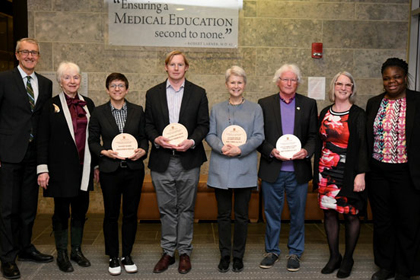The Larner College of Medicine at the University of Vermont held its first-ever event to celebrate and recognize achievements in gender equity on March 4, 2020. Governor Madeleine Kunin provided a keynote address, followed by an awards ceremony at which Ramsey Herrington, M.D., Mary Cushman, M.D., M.Sc., Debra Leonard, M.D., Ph.D., and Lauren Elizabeth Faricy, M.D., were recognized.

Dean Page; Gov. Kunin; Dr. Faricy; Dr. Herrington; Dr. Leonard; Professor Emeritus William Pendlebury, M.D. (on behalf of his wife, Dr. Cushman); Dr. Dougherty; Margaret Tandoh, M.D., Associate Dean for Diversity and Inclusion. (Photo: David Seaver)
The Larner College of Medicine at the University of Vermont held its first-ever event to celebrate and recognize achievements in gender equity on March 4, 2020. In addition to a keynote presentation by Governor Madeleine Kunin, the event featured an awards ceremony at which Ramsey Herrington, M.D., assistant professor of surgery and chief of emergency medicine, Mary Cushman, M.D., M.Sc., professor of medicine and director of the thrombosis and hemostasis program, Debra Leonard, M.D., Ph.D., professor and chair of pathology and laboratory medicine, and Lauren Elizabeth (L.E.) Faricy, M.D., assistant professor of pediatrics, were recognized.
Following remarks from Dean Richard L. Page, M.D., and Gender Equity Liaison Anne Dougherty, M.D., M.A., Kunin read poignant excerpts from her latest book, titled “Coming of Age: A Journey to the Eighties,” and participated in a 30-minute Q&A interview moderated by Associate Dean for Public Health and Health Policy Jan Carney, M.D., M.P.H. Among the questions Kunin was asked was “What strikes you most about the gender equity movement . . . why is it so slow?” She replied that “women still feel like they need a certain pedigree [to take on a higher-level position or political role] which is why we started EmergeVT,” referencing the non-profit she founded, which recruits and trains women to run for elected office.
Herrington received the Gender Equity Champion Award, which honors a Larner College of Medicine faculty, staff, or student who has demonstrated outstanding commitment and service to the advancement of women and those with underrepresented gender identities beyond the scope of their job, area of research, or training. Cushman was the recipient of the Gender Equity Outstanding Achievement in Medicine and Science Award, which honors a faculty member show is female-identified or of an underrepresented gender who has demonstrated outstanding achievement in medicine and science through research, education or service. The Polaris Award for Outstanding Mentorship, which honors a faculty or staff member who provides outstanding formal or informal mentorship for College community members who are female-identified or an underrepresented gender, went to Leonard. Faricy was honored with The Rising Star Emerging Professional Award, which recognizes a faculty or staff member who is female-identified or an underrepresented gender who is in the early stage of their career, who demonstrates excellence in contributions to students, colleagues, and/or the institution in the areas of gender equity and inclusion through service, program development, teaching, research or beyond.